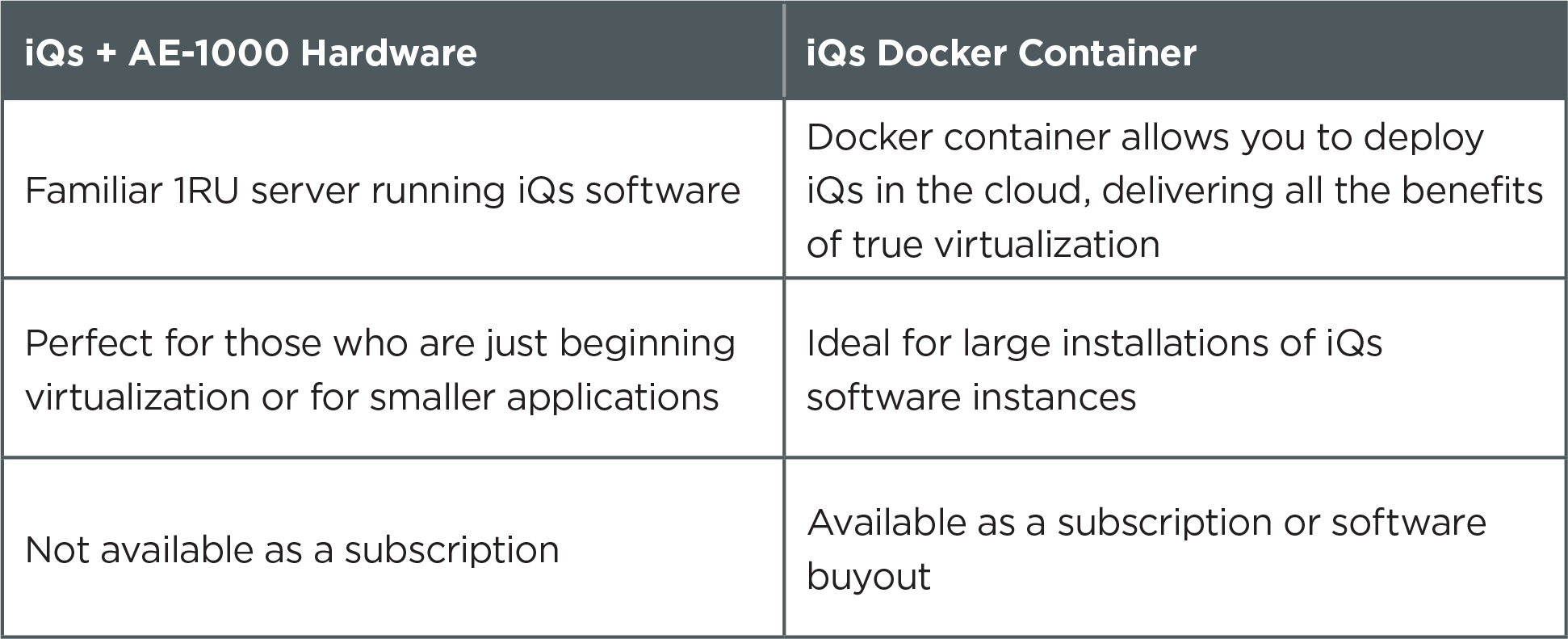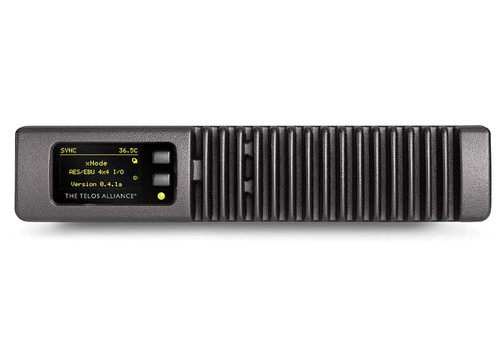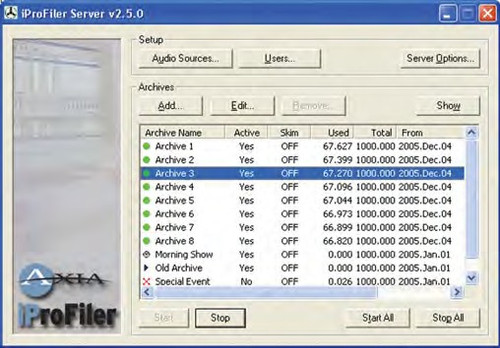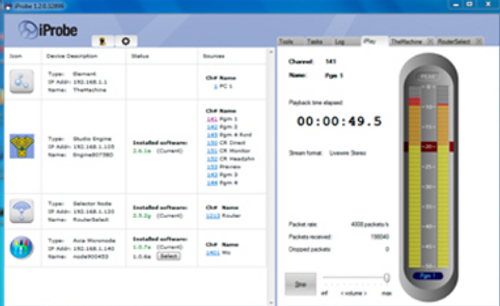Overview
Applications
-
Console capability without the physical surface
-
Distributed / remote workforce
-
Temporary studio anywhere (nontraditional studio space)
-
Studios lacking physical space
-
Multiple users who need concurrent collaboration on a single mix
Telos Alliance® was there for you when you made the leap to IP, and now we’re here to help you on the journey to virtualization, wherever you are on that path. Our goal is to give you broadcasting options that are familiar while creating new ways of working that deliver on virtualization's promise of added scalability, adaptability, cost efficiency, simple deployment, and reliability. And that’s just what we’ve done with our new Axia iQs AES67 Mixing Console Software.
More than a decade ago, Telos Alliance created the Axia iQ AoIP console, now known for its ability to deliver a powerful and flexible mixing experience. Rather than pay for unwanted extras and faders, iQ allowed broadcasters to work smarter, offering the ‘just right’ functionality to mix content how they wanted, without sacrificing features.
Then we took the iQ philosophy and upgraded its underlying technology to create the Axia iQx AES67 console, the first AES67 AoIP console to combine the mix engine and console into one chassis. iQx lets you plug right into your AoIP network —with complete AES67 / SMPTE ST-2110-30 compliance— and enjoy the same capable, easy-to-use experience of the iQ.
Now, the Axia iQ family takes a bold step into the virtual AoIP future with iQs, the software version of iQx that does not require a physical surface. iQs is the first soft console controlled by a full HTML-5 interface, allowing you to not only control a mix from anywhere, but on any device—Mac, Windows, tablet, laptop, even your phone! It’s available in two ways to suit your needs and comfort level.
The Benefits of Virtualization
Non-Proprietary Hardware
You have more options when it comes to designing your system, including commercial off-the-shelf (COTS) options from the IT world.
Customizable
The virtual broadcast studio is customizable, because functionality is not hard-coded to a specific physical attribute on a piece of hardware, like a physical surface.
Scalable
You can run multiple instances of software concurrently, allowing you to scale up for demanding production requirements and scale back down accordingly, only paying for what you need.
Reliable
Virtual software and cloud computing are tested, tried, and true. Broadcasters need not worry about reliability compared with hardware options.
Cost-Efficient
Requires less maintenance, hardware, real estate, conditioned power, HVAC, and associated costs with flexible subscription models to meet OPEX business requirements.
Easier Upgrades
Easier to update software remotely over the Internet or en masse in a centralized data center, eliminating site visits.
2 Ways to Deploy iQs AES67 Virtual Console Mixing Software
iQs + AE-1000 for Easy Virtualization
Telos Alliance understands that virtualizing studio operations can be an overwhelming prospect. That’s why we are eliminating some of the legwork by pre-installing the iQs AES67 Mixing Console Software on a 1RU Telos Alliance AE-1000 Application Engine—our new line of universal servers—to help you ease into the virtual studio and prepare for the future. You can centralize the AE-1000 at the studio, yet give board operators the flexibility to control the iQs mix from a bedroom, a coffee shop, a makeshift studio...anywhere with an Internet connection.
iQs Container for the Data Center
iQs is available as a Docker container. Docker is a set of platform-as-a-service products that uses OS-level virtualization to deliver software in packages called containers. Containers are isolated from one another and bundle their own software, libraries and configuration files; they can communicate through well-defined channels. Docker is an integral part of the IT future.
Because iQs is available as a Docker container, it allows broadcasters to deploy it in a server farm or the cloud, delivering the added benefits of true virtualization, such as easier facility-wide upgrades, concurrent instances, and more, without site visits. Perfect for large installations of iQs console software instances.
iQs in a Docker container lets you realize your all-virtual future now because it’s available as a subscription-based model in addition to singular instances. A subscription allows you to be even more nimble—growing or shrinking the size of your system dynamically as your needs change. You only pay for the functionality you need, and you aren’t locked into any particular console configuration, large or small, for the ultimate in facility flexibility.
Features
iQs Deployments
-
Software running on Telos Alliance 1RU AE-1000 Application Engine (buyout only)
-
Docker container lets you deploy iQs in a server farm or the cloud (available as buyout or subscription model)
iQs Features
Flexible
-
Browser-based (HTML-5) and therefore accessible from any device (Windows, Mac, Tablet, Smartphone
Interoperable
-
Standards-based console supports AES67 and SMPTE ST-2110-30; works with any AES67, Livewire+ AES67, or Livewire® source
-
Assign any AoIP source to any channel, like having more than 16 million patch points!
Easy to Use
-
Familiar console interface in a software format allows users to get up and running fast, on any HTML-5 device!
-
Smooth handoff from one operator to the next, even in remote locations
-
Use iQs with Axia Pathfinder (not included) to easily route, monitor, and control AoIP sources
Broadcast Ready
-
3 dedicated stereo Program busses, plus a stereo Utility bus that can be used for phone calls, off-air recording, or as a fourth Program bus
-
Automatic mix-minus on each fader, plus talkback functions
-
Automix automatically balances levels of on-air-microphones when more than one mic is open at a time in a studio
-
Off-Air Record Mode Trigger
-
Studio and Control Room monitor controls
-
24 built-in stereo three-band EQs
-
Channel-input confidence meters assure the operator of audio presence before taking sources to air
-
Profile context-sensitive Soft key can be used to activate talkback, start delivery system events, or perform other special functions
-
Stereo PFL (“cue”) functions for every fader with a unique interlock system for the fast cueing of multiple sources
-
Reconfigurable CR monitor section with direct selection of 4 program busses and re-assignable buttons that allow instant monitoring of external sources
-
Additional monitor section provides separate monitor volume, source selection, and talkback controls for an associated studio
-
Flexible built-in mix-minus and talkback system lets operators talk to phone/codec sources, each with an associated, automatically created backfeed mix-minus
-
Precision event timer can be operated manually or triggered by starting preselected sources
-
Unlimited Source Profiles with four quick-recall snapshots (show profiles)
-
Auxiliary “V-Mix” remotely controllable 5-input virtual mixer, for whatever extra audio needs you may have
In Depth
iQs Deployments at a Glance

Scalable to Fit Your Needs
iQs is also more flexible than its physical counterparts, starting with a base iQs 4-fader software module and growing in increments of 4 faders (instead of 6 or 8), up to 24 faders. This flexibility allows you to precisely dial in your soft console, without paying for extra faders you don’t need.
With iQs, you get all the functionality and flexibility of our popular iQ and iQx physical consoles in a more convenient, scalable, and flexible format that delivers the mixing capability you need, where you need it, on any device.
Expand iQs Capabilities with Axia Pathfinder Core PRO
Livewire+™ AES67 is Telos Alliance’s AoIP protocol that not only enables high-reliability, low-latency uncompressed digital audio over Ethernet, but incorporates logic, control, and program associated data (PAD) abilities. Since no signal routing solution is useful unless you can control and manage the system effectively, Telos Alliance Pathfinder Core PRO is the key to unlocking the true potential of a Livewire+ AES67 ecosystem.
By discovering and identifying all compatible devices connected to the system, Pathfinder identifies each available AoIP source and destination. As a middleware layer using its onboard protocol translator to connect with many commonly used third-party controllers, it serves as an AoIP router, an ideal core infrastructure component for diverse broadcast audio applications. Pathfinder can schedule and trigger events, detect audio silence, issue alarms, and instruct failover routing. It even allows the user to create custom screen-based control and monitoring panels.
Due to an unprecedented level of control included in the iQs platform, you can vastly expand your system capabilities by using Pathfinder Core PRO in concert with iQs. Need to automatically dial your Z/IP ONE when you load your show? Change your program bus assignments depending on whether you are on the air or not? Fire automation system automatically when you turn your mic off? Load a show profile every day at 3:30? Raise an alert if audio is not being received correctly? Pathfinder can do it all. Additionally, use the HTML-5 panels in Pathfinder or Axia IP-Tablet to customize and develop your own user interface for iQs.
TelosCare PLUS SLA
Service Level Agreements (SLAs) are the future of broadcast, and we are here to support you with our new TelosCare PLUS SLA, free for the first year with your purchase of iQs. With TelosCare PLUS, you will always have the most up-to-the-minute release of iQs.
But that’s not all you get. In addition to software updates and upgrades, you have unfettered access to Telos Alliance’s support team, discounts on remote assistance, free priority repairs, and more for both hardware and software. TelosCare PLUS keeps your broadcast operations running smoothly.
Specifications
Specifications for iQs + AE-1000 Server Deployment

AE-1000 Inputs/Output
-
AE-1000 supports a single instance of iQs, which will accommodate up to 24 faders. Start with the base 4-fader module, add faders in increments of 4 up to 24, each with instant access to any AoIP source
-
34 inputs x 24 outputs total, all AoIP, including four main stereo program bus outputs, plus bus outputs for Record, Phone, CR Monitor, CR Monitor Direct, CR Headphones, Preview, Talkback to CR, Talkback to External, Studio Guest HP, Studio Monitor, Studio Talent HP
-
Automatic mix-minus provided for any source input
-
2 network ports, 1 for a link to the AoIP network and 1 for a local xNode or other network device
-
Fanless
-
PoE or DC 12 volt
AE-1000 Dimensions
-
1RU
-
Unit weight: 6 lbs
-
Shipping weight: 8 lbs
-
W:~482.6mm, L:~88mm, H: ~43mm
-
Shipping dimension = 20L x 9W x 6H inches
Minimum Requirements for iQs Docker Deployment
-
Server-class multi-core CPU(s), 2.0Ghz minimum
-
Memory: 1GB of RAM per each iQs, minimum
-
Docker hosting platform: Docker Engine on Linux (Ubuntu 18.04 LTS) server.
-
Number of server CPU cores required for iQs instances with 24 fader channels
-
For up to 3 iQs instances in the server: one reserved core for each iQs, plus one core system base.
-
For 3 up to 8 iQs instances in the server: one reserved core for each iQs, plus 2 system cores.
-
For more than 8 iQs instances in the server: one reserved core for each iQs, plus 3 system base cores.*
-
-
For smaller iQs instances with up to 12 faders, two iQs instances can be run per each reserved core.
-
For up to 6 small iQs instances: one reserved core for each two small iQs, plus one core system base.
-
For 8 up to 16 small iQs instances: one reserved core for each two small iQs, plus 2 cores system base
-
For more than 16 small iQs instances in the server: one reserved core for each two iQs, plus 3 cores system base.*
-
Example deployments

*Large server configurations require the additional system cores allocated for network I/O overhead.
Virtualization Platforms
The iQs is delivered as a Docker container. The Docker host (Docker Engine) can be run either on a bare metal server or inside of a virtual machine (when running in the cloud, Docker is always run inside a cloud-hosted VM).
When Docker is run inside of a VM, there are performance requirements on the virtualization platform in order not to introduce latencies and throughput bottlenecks underneath Docker, which would affect the real-time audio.
If Virtualization is used, a type 1 Virtualization host capable of:
-
Exclusive allocation (i.e., pinning) of CPU cores to virtual machines
-
Allocation of CPU resources to network I/O traffic
Note: The number of server CPU cores required is the same as listed above in the Docker Deployment section.


















